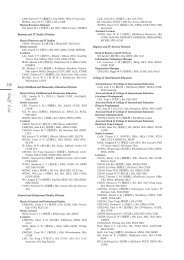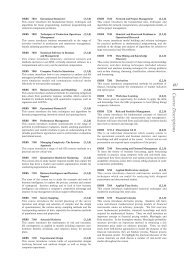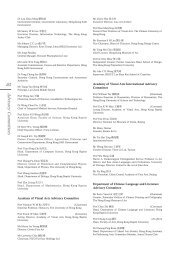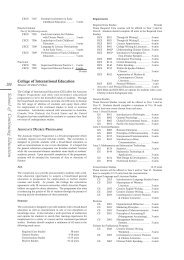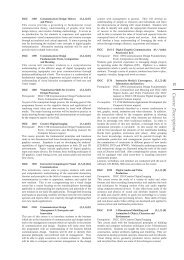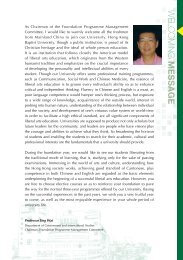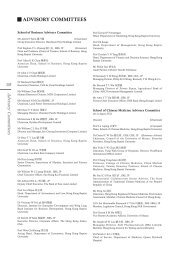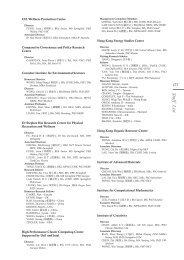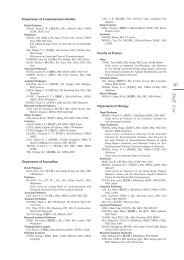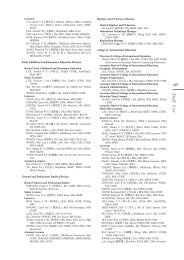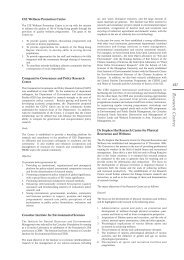356<strong>Course</strong> <strong>Descriptions</strong>with some common and interconnected ethical issues throughcase studies. Codes of conduct of different professions andcodes of conduct of the same profession in different cultureswill be compared. Different patterns of moral reasoning andtheir underpinning moral philosophies (deontological theory,Utilitarianism and virtue ethics) will be examined.GCVM 1017 Freedom in Modern Society (3,2,1) (C)This course will discuss the moral foundation of freedom andthe ethical issues related to the ideas of freedom in the modernfree society. First, the history of liberty and tolerance will besketched. Then different concepts of freedom, e.g. negative andpositive freedom, will be explained through discussions of theprominent philosophers like John Locke, John Stuart Mill, IsaiahBerlin, and Charles Taylor. Different theories of freedom fromboth secular and religious perspectives (such as secular liberalism,conservatism, Confucianism and Christianity) will also beexpounded and compared.GCVM 1025 Give and Forgive: Christian (3,2,1) (E)PerspectivesThis course examines two major practices at the heart of theChristian faith—giving and forgiving, together with the underlyingChristian concepts of grace and human person. It explorescritically the implications of Christian giving and forgiving forour contemporary culture which is increasingly self-serving andunforgiving. Students will be introduced to the Christian conceptsof creation and providence, justification and reconciliation, graceand personhood, God the Giver and the Forgiver, etc. This courseevaluates critically these concepts together with all related theoriesin the contexts of competition and conflict.GCVM 1026 Globalization and Ethics (3,2,1)This course is designed to introduce students to the identificationand evaluation of moral dilemmas in the context of change anddevelopment in an increasingly globalized world. This courseinterrogates the relation between globalization and ethics in twosteps, analytic and constructive. The sessions of analysis includethe attempt to understand the constitutive economic and culturaldynamics of globalization, some of its ecological impacts, andthe ways in which it generates different forms of social life andmodes of thinking. Then it will turn toward study of the insightsof some philosophers, such as Peter Singer, William Sullivan andWill Kymlicka, in order to learn from as well as to challenge thequestions they raised.GCVM 1027 Good Life in a World of (3,2,1)Self-interestSome philosophers characterize the contemporary world as aworld of self-interest. People of this age live largely self-interestedlives. Is living a self-interested life the only rational option thatwe have? Is there still anything else to live for? Is anything worthpursuing apart from money, love, good career, prestige and socialstatus? Is there any better alternative to the conventional pursuitof self-interest? The course will address these questions throughexploring philosophical ideas and theories that have importantbearing on how to answer the questions. Special attention willbe given to the philosophical views such as Hedonism, Egoism,Aristotle’s theory of good life, Utilitarianism, Confucianism andDaoism.GCVM 1035 Green Living and Spirituality (3,2,1)This course will study the statements made by the five establishedreligions within the People’s Republic of China—Buddhism,Catholic Christianity, Daoism, Islam and Protestant Christianity—along with the Ruist (“Confucian”) tradition about environmentalethics and “green living” in order to justify them in the lightof their spiritual traditions. Much can be learned about thedifferent worldviews they represent and some of their significantshortcomings regarding environmental ethics. Problems suchas how they conceive the relationship between humans and thenatural environment, and how influential these various claimsare within Chinese social and political contexts (including <strong>Hong</strong><strong>Kong</strong>, Macau, Taiwan, and the mainland) will be addressed andcompared.GCVM 1036 Human Rights in a Multicultural (3,2,1)WorldIn this course, the basic concepts of rights will be explained andthe historical development of these ideas traced briefly. Then theperspectives of different philosophical traditions (such as liberaldeontological,liberal-utilitarian, communitarian and Marxist)on human rights will be expounded. Further, both western andnon-western religious views on human rights will be introduced,e.g. Confucianist, Buddhist, Islamic and Christian. Students willlearn to identify, understand and reflect on ethical issues such asthe ethical foundation of rights, the balance or tension betweenindividual rights and good society, and conflicts between differentkinds of human rights.GCVM 1037 Marriage and Family: Dreams (3,2,1)and RealityThis course aims to introduce students to ethical issues in marriageand family such as cohabitation, adultery, open marriage,homosexual marriage, polygamy, divorce, having children,rearing children, and duties of grown up children to their parents.Different underpinning moral-social-political philosophies(liberalism, communitarianism, feminism, Confucianism) will bediscussed and analysed. Both the human aspirations and dreamsabout marriage and family and the reality of human nature andhuman society will be taken seriously. Both the arguments for andagainst a certain view will be critically examined.GCVM 1045 Matters of Life and Death (3,2,1) (C)The course aims at helping the students to develop a criticalunderstanding of issues concerning life and death such assuicide, abortion, euthanasia and grief. Ideas of life and deathin philosophical and religious traditions such as Confucianism,Buddhism, Daoism, Christianity, German idealism, existentialismetc will also be discussed. The course also intends to equipstudents with not only the knowledge about values and beliefsconcerning life and death in different religious and philosophicaltraditions and cultures, but also help them to appreciate beliefsother than their own.GCVM 1046 Moral Challenges in Chinese (3,2,1) (C)Popular CultureThis course will address the problem of the increasing tensionamong traditional Chinese value systems (Confucianism andDaoism), Communist moral codes, and new values generatedfrom mass-mediated popular culture in contemporary China in thelight of a globalized world, and analyse how such critical factorsas self-identity, gender, age, sexuality, class, region and state areshaped by and reshaped in consumerism and popular culture asseen in fashion, fads, entertainment, religion, art, and literature.The course will offer a critical reflection on contemporaryChina which is confronting with ethical challenges and urgentmoral renewals. Relevant moral theories such as utilitarianism,deontological principles, and virtue ethics are discussed inpreparing students to analyse critical issues they face in their dailyexperience of popular culture.GCVM 1047 Moral Heroes in an Immoral (3,2,1)WorldWomen and men who have championed visions of a better life,enduring personal threats and social opposition to realize theirgoals, are moral heroes. On the basis of this understanding,students will be introduced to some of the most influential moralheroines and heroes of the last two hundred years, includingNobel Peace Prize winners such as Mother Theresa and otherswho have endured the controversies inherent in moral leadershipand become highly regarded paragons of particular societies, e.g.William Wilberforce, Mohandes Gandhi and Chuck Colson. Thecourse will identify the values which prompted these people tochallenge the status quo, explaining the power of these values inthe light of virtue ethics, deontology, and the specific religious
and/or philosophical traditions these heroes represent (includingBurmese Buddhism, Roman Catholic and Protestant Christianity,and popular Hindu traditions).GCVM 1055 Real Sex, Naked Truth: Christian (3,2,1) (C)Values in Changing Chinese SocietiesThis course examines Christian perspectives on sex/uality,together with the underlying Christian faith and values, as wellas the integral relation between sex/uality and the whole person.It explores critically their implications for and relevance in fastchanging Chinese societies in the last few decades. Students willbe introduced to Christian concepts of body, intimate relation,sexual intercourse and personhood, etc. These concepts andrelated theories will be critically evaluated in the context ofcontemporary Chinese societies, including the problems, tensionsand challenges arising from selected social issues. Specialattention will be given to public discourses as reflected in Chinesemass media and popular writings.GCVM 1056 Religious Values and Pop Culture (3,2,1) (C)The course utilizes various forms of pop culture such as films,games, internet web innovations and modern play and drama aspowerful new cultural media comparable to literature as modernpeople’s main venue for experiencing, appreciating and reflectingon human life. Such reflections of modern life would be takento the religious dimension in its search for meaning and valuethat seeks to transcend temporality and secularity of life, andreaches for the ultimate elevation of the human spirit. The courseexamines the various ways in which modern people’s myriadendeavors in socio-cultural actions embark on a profound searchfor human reality, possibility, value and meaning in this globalizedand networked world.GCVM 1057 Romantic Love in Humanistic (3,2,1) (C)PerspectivesThis course introduces recent theories of romantic love andsex in humanistic perspectives utilizing insight from both artsand science. This course explains humanistic perspectives onromantic love from different cultures made available in literature,philosophy, religion and mythology, and supplement them withnew understandings of romantic love and sex due to advancesin scientific and sociological disciplines. Students would alsolearn through tutorial some psychology of romantic love and sex,understand their role in the formation of modern identity, andlearn to assess authenticity of romantic love experience.GCVM 1065 The Art of War and the Art (3,2,1)of LivingThe Art of War () by Sunzi is not just about warfare;it is about strategy. It is not only about battlefield maneuvers,but also about economic, political, psychological and moralfactors behind corporate leadership and success. Its most famousliterature on stratagem, “The 36 Strategems”, is widely read andapplied to the business world, sports, negotiation and lawsuits,and leadership training today, East and West. This course willextrapolate further the rich ideas of this book and similar books ofthat period (known as “military strategy” school ( ), e.g., ) and show how they shed light on manyethical issues in life, such as when and how to use violence and themoral ambiguity of deception. The ethical thought and reasoningbehind different strategies will also be examined. This courseshows how ancient Chinese culture can still provide practicalwisdom (phronesis, as Aristotle puts it) to guide the journey oflife.GCVM 1066 The Art of Thinking and Living (3,2,1) (C)Three ethical perspectives, namely, the perfectionist, utilitarianand Kantian, will be discussed in this connection. In this course,students will be introduced to the basic concepts and principlesof good decision-making and effective problem-solving. Specialattention will be given to how these concepts and principles canhelp students improve their decision-making and problem-solvingtechnique. Students will also learn how to apply the concepts andprinciples in making decisions and tackling problems in everydaylife situations critically and creatively. In this regard, generalissues and problems in relation to work, wealth, love, health,death and seeking one’s meaning of life will be used as examplesfor discussions.GCVM 1067 Understanding Christian Ethics (3,2,1) (C)in a Pluralistic SocietyThis course presents a model for ethics in a pluralistic society,examining the ethical theories of obligation and value fromsecular and Christian perspectives. The lectures survey variousethical systems, identify unstated assumptions in ethical theories,and evaluate those theories for legitimacy, relevancy, and cogency.This course addresses the interplay between norms in differingmoral situations and in cases of conflict of duties. We willexamine moral issues of human life, sexuality, class relationships,management of resources, law and authority in conflict situations.GCVM 1075 Virtuous Living in a Virtual World (3,2,1) (E)This course lets students to criticize how can virtues ofdiscernment, moderation, wisdom, humility, authenticityand humanness as presented in traditional and modern virtueethical theories (Aristotelian, Confucian, Christian, Humeanand Nietzschean) be realized with the habits of our high-techlifestyles? It teaches students to develop critical attitudes related tothe ideological overstatements and addictive practices associatedwith cyber-shaped lifestyles. It tells students how to debunk theso-called pseudo-religious ideologies supporting informationismas the panacea for human problems and human boredom.This course also teaches students a need to develop habits ofmoderation which neither support bandwidth envy nor allow forimpersonal crudeness.GCVM 1076 Whose Justice? And for Whom? (3,2,1) (E)Justice is a moral idea that we all appeal to in conflicts ofmodern societies. Opposing sides of an issue both claim tobe the apostle of justice. Hence we need to reflect criticallyon the questions “Whose justice?” and “Justice for whom?”.This course introduces students to some major philosophicalschools of thought on justice, such as liberalism, libertarianism,utilitarianism, egalitarianism, socialism, and the theory of desert.Topics that will be discussed include selected examples fromcorrective justice, gender justice, sexual justice, racial justice,penal justice, economic justice, international trade justice, intergenerationaljustice, and climate justice.GCVM 1077 Wisdom in Chinese Religious (3,2,1)Tales and FictionThe course will focus not only on the wisdom in traditionalChinese religions such as the Buddhism, Daoism andConfucianism, but also that of the popular religions as well.Through a study of the wisdom embodied and manifested inChinese tales and fictions, this course will critically exploretraditional Chinese world views, beliefs and ethical values anddiscuss such perennial issues as filial duty, love relationship,struggle between good and evil, sex and morality from historicaland cultural perspectives.GCVM 1085 Zen Buddhism and Modern (3,2,1)WorldThis course provides a broad and deep understanding of ZenBuddhism in the aspects of doctrine, practice and application inlife. In particular, students will learn to: (1) understand Zen froma critical viewpoint as to how it can be a useful and living religionto be lived and enjoyed in modern world; (2) reflect on the ideasand efforts of important contemporary Buddhist schools such asthe Tzu-Chi School, Dharma Drum Mountain and Buddhist LightMountain in dealing with key problems in modern world; and(3) eflect upon the possible contributions and limitations of Zenideas and practices for both the modern world and the studentsthemselves and, thereby, enrich their future development towardsthe ideal of a whole person.357<strong>Course</strong> <strong>Descriptions</strong>
- Page 3 and 4:
economic growth, trade, pollution,
- Page 5 and 6: specific empirical economic problem
- Page 7 and 8: of private enterprises in the indus
- Page 9 and 10: period. The first part of the cours
- Page 11 and 12: The reactions and effectiveness of
- Page 14: 314Course DescriptionsEDUC 3080 Tea
- Page 17 and 18: development of children and adolesc
- Page 19 and 20: and communication skills in differe
- Page 21 and 22: y ubiquitous technology. Learners w
- Page 23 and 24: ENG 2650 Topics in English Grammar
- Page 25 and 26: clause structures of the English la
- Page 27 and 28: adopted for reading and interpretin
- Page 29 and 30: drama; and (2) introduce Western dr
- Page 31 and 32: ENGL 4005 Advanced Topic in Compara
- Page 33 and 34: attendant to the break-up of mediev
- Page 35 and 36: EURO 3205 Comparative Politics of (
- Page 37 and 38: states, enlargement provides signif
- Page 39 and 40: to create and develop ideas via rel
- Page 41 and 42: strategies of awarded campaigns to
- Page 43 and 44: characteristics of films, film-make
- Page 46: 346Course DescriptionsFINE 1005 Fin
- Page 49 and 50: GCHC 1005 China and the Global Econ
- Page 51 and 52: the period with a special focus on
- Page 53 and 54: est decision-making procedures. Mor
- Page 55: GCPE 1065 Table Tennis (1,2,0) (C)T
- Page 59 and 60: on the use of English in various se
- Page 61 and 62: GDAR 1835 Music, Mind, and Human (3
- Page 63 and 64: lead to successful development of n
- Page 65 and 66: management and proactive stakeholde
- Page 67 and 68: GDCV 1065 Buildings of Hong Kong: (
- Page 69 and 70: of various religions that broaden t
- Page 71 and 72: their implications for contemporary
- Page 73 and 74: gone through since 1945 included th
- Page 75 and 76: GEOG 1005 Geography and the Contemp
- Page 77 and 78: students to the concepts and techni
- Page 79 and 80: GEOG 3730 Energy Policy and Analysi
- Page 81 and 82: processes interact with China’s s
- Page 83 and 84: GERM 1006 German II (3,3,0) (G)Prer



